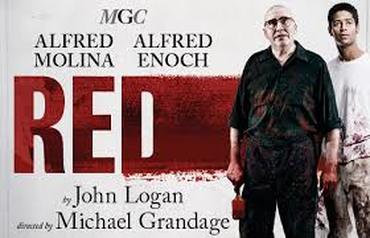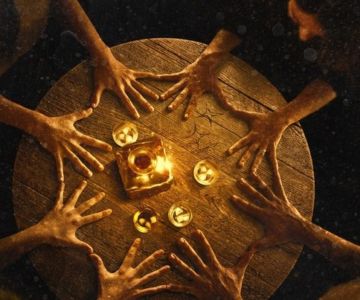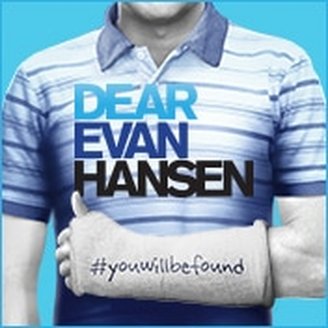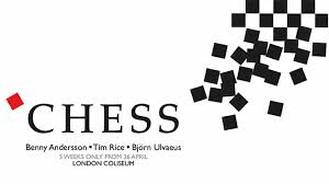 Another Overnight Train: Kyiv to Warsawby Randi / May 14, 2018
Another Overnight Train: Kyiv to Warsawby Randi / May 14, 2018It’s Theatre Thursday! Today we are talking about “Red” on the West End, playing until the end of July.
Although giving props to white men right about now is the last thing we should be doing, I have to give some (is it a mass noun?) to white male playwright John Logan for being the first person to depict serious art and the modern art world without making me scream from the cringe. (“Sunday in the Park with George” is not about modern art and it is still the best depiction of the artist and the creative process ever to exist in the history of the world.) Whenever I’ve watched stories about self-important artists, fictional or not, or even just gone to a modern art museum (ew and oh no) my main thoughts have been ‘oh my gooooood get over yourself’. The whole ‘I have something to say and this splash of paint thrown against a singed canvas represents that but also progress and our birth’ charade makes my blood boil. Maybe it’s just because artists are so often portrayed in pop culture as pretentious wankers who really believe they have something urgent to say but they really really don’t, like Sky in “Red Oaks” (great under-the-radar show, go watch it). And all of her insufferable artist friends man alive they are the perfect example of this. You just want to Cher in Moonstruck all of them. Anyway before I start ranting even more about all the various portrayals of arrogant, affected artists in movies and TV, let’s talk about this representation of a modern artist that I actually bought into and understood, the play “Red”, about Mark Rothko’s tortured creative process.
Although giving props to white men right about now is the last thing we should be doing, I have to give some (is it a mass noun?) to white male playwright John Logan for being the first person to depict serious art and the modern art world without making me scream from the cringe. (“Sunday in the Park with George” is not about modern art and it is still the best depiction of the artist and the creative process ever to exist in the history of the world.) Whenever I’ve watched stories about self-important artists, fictional or not, or even just gone to a modern art museum (ew and oh no) my main thoughts have been ‘oh my gooooood get over yourself’. The whole ‘I have something to say and this splash of paint thrown against a singed canvas represents that but also progress and our birth’ charade makes my blood boil. Maybe it’s just because artists are so often portrayed in pop culture as pretentious wankers who really believe they have something urgent to say but they really really don’t, like Sky in “Red Oaks” (great under-the-radar show, go watch it). And all of her insufferable artist friends man alive they are the perfect example of this. You just want to Cher in Moonstruck all of them. Anyway before I start ranting even more about all the various portrayals of arrogant, affected artists in movies and TV, let’s talk about this representation of a modern artist that I actually bought into and understood, the play “Red”, about Mark Rothko’s tortured creative process.
It’s quite surprising that the subject of a play that made me more sympathetic to the strife and struggles of tormented artists is Mark Rothko, whose famous canvases are exactly the sort that would normally make me comment ‘well I made that same thing when I was five um what’ so yes this play is an achievement. It’s easy to recognize a Rothko work because it’s the one with a smudged rectangle of one color painted on it and if you’re lucky you get a second smudged rectangle of a different color. It’s the epitome of art that I simply don’t understand. It’s not that I like or dislike it but there’s only so much you can ‘feel’ from looking at a smudged rectangle, you know? How do people pay millions of dollars for big canvases with just a messy red square on it? Happily, these are questions that Logan addresses in his play “Red”, which originally premiered in London and now is back on the West End with original star Alfred Molina as Rothko.
Molina’s Rothko is the kind of performance that makes you forget that you are watching one. It quickly lets you dive in and accept that you’re watching Rothko the artist work, without ever thinking about his acting. It’s a rare performer that can so completely inhabit the character like that, erasing any trace of the actor or his well-known past performances and just presenting Rothko on that stage so fully. I didn’t get to see Fred (as his friends call him) perform this role on Broadway after its premiere but I understand now how he could have won that year’s Distinguished Performance Award from the Drama League, the best acting award there is really. I get how this performance could have defined what acting is and should be for a whole season. Fred’s costar in this production fares well but not nearly as expertly. Alfred Enoch plays Rothko’s assistant, and so we have probably the first play in the history of the theatre/the world where 100% of the cast is named Alfred. So, Enoch’s playing the role that won Eddie Redmayne a Tony. I imagine Redmayne, a stellar actor, probably also disappeared into the role, while Enoch, though he does a great job, still showed me that he was Acting quite often, mainly when using props – opening jars, mixing paint. It was often a little too stagey. Honestly, I kept thinking of the part in “Oh, Hello” when they talk about using props and John Mulaney says, “Please, do WAY too much business with the phone. Really show the audience you’ve been working with the prop all week” and Nick Kroll says “Really make a meal out of it.” So that’s what his performance, while commendable, kept reminding me of. A little too unnatural, maybe because most of his career has been onscreen (although that’s over right now #wesforever).
The play begins with the new (fictionalized) assistant arriving for his first day of work. I just looked up what the assistant’s name is and it’s Ken and I’ve never been so surprised by a fact in my life. I don’t think they ever say it but also like who is named Ken anymore. I guess this was supposed to take place more than 50 years ago but were there even Kens then? Ken (I mean) arrives in a suit for his first day of work and that’s cute but his work is in Rothko’s messy, splattered art studio so Rothko’s like “that’s cute, go change” and I like that he was a no bullshit kind of guy like that but at the same time sooooo full of bullshit like when he talks about how his red glop of paint represents everything anyone has ever felt and all that. But wait, like I said I don’t actually think that’s all utter bullshit anymore, actually, because of this play. Watching the creative process and hearing the artist debate what his work means with another artist, kind of in their own Socratic method to get to the heart of the matter, was enlightening for me, a renowned modern art truther.
Mark and Ken work together to produce Mark’s famous four murals for the new Four Seasons restaurant in the Seagram building in Midtown Manhattan. Ken is shocked that Mark accepted such a commission, creating art for a dining room full of rich obnoxious people that he despises. But Mark’s hope is to destroy their appetite, ostensibly by making them confront their inner demons and fears and passions and maybe realize how terrible they are by forcing them to confront what they feel the red means. And that question, what the red means to the individual, is mainly what Ken and Mark discuss in between mixing the paint and prepping the canvas – the latter of which is the most fun bit of the play, and from the looks of the Alfreds afterward, the most exhausting cardio. The question of what the red means, and how different and complex it can be for each individual, and all that talk talk they make in my earholes about it, is honestly what got me to come around on the whole modern art thing. Well at least Rothko’s. Well at least his red series. There is meaning and such depth of emotion and personal history and tragedy and fear and hope behind those colors, even though it looks like a simple square of paint that could have been done by a child. There really is more to it than that. And while I don’t think it should be necessary for a play to make you appreciate art, I’m grateful that this one makes me a little less hateful towards that gallery across the river from me (cough *Tate Modern* cough).
Despite being far from warm, the relationship between the two men is the provocative aspect of the show. I love how time passes for these men – two years at least – and it doesn’t seem like it. Ken seems just as unsettled at the end as he did at the beginning, and Rothko is just as detached, despite their heated discussions. I bet that Ken never showed him any of his own work. Mark wasn’t that kind of guy, the one you show your work to and ask for his ‘honest’ opinion. It would be too honest. Yet it’s clear they care for each other; you just have to understand how the artist’s mind works, as I do now (laugh). Even in his final act towards Ken, Mark doesn’t seem affectionate or caring, but his actions speak much more than his words or demeanor. There’s so much more to them than whether or not Rothko can be a nurturing father figure (he can’t) or whether that’s even what Ken wants. And there’s more than meets the eye with how the action is staged too, like how Ken finds a superdrunk Mark with his hands in his paint bucket one night, an undeniable reference to his real-life suicide. This kind of subtle direction plus the way the characters communicate with each other all feel connected to the issue of the colors and how sensitive the interpretation of them can be to each person, how just the color red can reference an entire lifetime of emotion. “Red” isn’t a big important political play or anything; it feels like a pleasant but small exploration of personalities more than anything. But if it can say so much about art and moreover get you to consider art more thoughtfully and genuinely than you had before, then that seems pretty important.
INFORMATION
The toilets at the Wyndham’s are atrocious. There are TWO ladies toilets for the entire stalls/orchestra section. The line was insane. They need to refurbish and until they do, sit on an aisle upstairs.
Also in need of a redo is their box office. For people picking up tickets at will call (literally everyone), there was ONE person at a makeshift podium handling collection. It was so inefficient I wanted to scream. I can’t with this incompetence all over the West End.
STAGE DOOR
The Alfreds are probably the nicest people who have ever come out of a stage door. Not the most efficient – there’s no Zachs Braff or Levi-style assured handling of the crowd (they would line everyone up for easy photo-taking or just take your phone and do it themselves, pros) but they were just so freaking nice, not turning anyone’s request down, even when they clearly wanted to leave and some old biddy was asking for them to sign her receipts after they already signed her ticket stubs. I wanted to be like ‘you don’t have to do this you can leave now!’ but they were just the sweetest.
Molina’s Rothko is the kind of performance that makes you forget that you are watching one. It quickly lets you dive in and accept that you’re watching Rothko the artist work, without ever thinking about his acting. It’s a rare performer that can so completely inhabit the character like that, erasing any trace of the actor or his well-known past performances and just presenting Rothko on that stage so fully. I didn’t get to see Fred (as his friends call him) perform this role on Broadway after its premiere but I understand now how he could have won that year’s Distinguished Performance Award from the Drama League, the best acting award there is really. I get how this performance could have defined what acting is and should be for a whole season. Fred’s costar in this production fares well but not nearly as expertly. Alfred Enoch plays Rothko’s assistant, and so we have probably the first play in the history of the theatre/the world where 100% of the cast is named Alfred. So, Enoch’s playing the role that won Eddie Redmayne a Tony. I imagine Redmayne, a stellar actor, probably also disappeared into the role, while Enoch, though he does a great job, still showed me that he was Acting quite often, mainly when using props – opening jars, mixing paint. It was often a little too stagey. Honestly, I kept thinking of the part in “Oh, Hello” when they talk about using props and John Mulaney says, “Please, do WAY too much business with the phone. Really show the audience you’ve been working with the prop all week” and Nick Kroll says “Really make a meal out of it.” So that’s what his performance, while commendable, kept reminding me of. A little too unnatural, maybe because most of his career has been onscreen (although that’s over right now #wesforever).
The play begins with the new (fictionalized) assistant arriving for his first day of work. I just looked up what the assistant’s name is and it’s Ken and I’ve never been so surprised by a fact in my life. I don’t think they ever say it but also like who is named Ken anymore. I guess this was supposed to take place more than 50 years ago but were there even Kens then? Ken (I mean) arrives in a suit for his first day of work and that’s cute but his work is in Rothko’s messy, splattered art studio so Rothko’s like “that’s cute, go change” and I like that he was a no bullshit kind of guy like that but at the same time sooooo full of bullshit like when he talks about how his red glop of paint represents everything anyone has ever felt and all that. But wait, like I said I don’t actually think that’s all utter bullshit anymore, actually, because of this play. Watching the creative process and hearing the artist debate what his work means with another artist, kind of in their own Socratic method to get to the heart of the matter, was enlightening for me, a renowned modern art truther.
Mark and Ken work together to produce Mark’s famous four murals for the new Four Seasons restaurant in the Seagram building in Midtown Manhattan. Ken is shocked that Mark accepted such a commission, creating art for a dining room full of rich obnoxious people that he despises. But Mark’s hope is to destroy their appetite, ostensibly by making them confront their inner demons and fears and passions and maybe realize how terrible they are by forcing them to confront what they feel the red means. And that question, what the red means to the individual, is mainly what Ken and Mark discuss in between mixing the paint and prepping the canvas – the latter of which is the most fun bit of the play, and from the looks of the Alfreds afterward, the most exhausting cardio. The question of what the red means, and how different and complex it can be for each individual, and all that talk talk they make in my earholes about it, is honestly what got me to come around on the whole modern art thing. Well at least Rothko’s. Well at least his red series. There is meaning and such depth of emotion and personal history and tragedy and fear and hope behind those colors, even though it looks like a simple square of paint that could have been done by a child. There really is more to it than that. And while I don’t think it should be necessary for a play to make you appreciate art, I’m grateful that this one makes me a little less hateful towards that gallery across the river from me (cough *Tate Modern* cough).
Despite being far from warm, the relationship between the two men is the provocative aspect of the show. I love how time passes for these men – two years at least – and it doesn’t seem like it. Ken seems just as unsettled at the end as he did at the beginning, and Rothko is just as detached, despite their heated discussions. I bet that Ken never showed him any of his own work. Mark wasn’t that kind of guy, the one you show your work to and ask for his ‘honest’ opinion. It would be too honest. Yet it’s clear they care for each other; you just have to understand how the artist’s mind works, as I do now (laugh). Even in his final act towards Ken, Mark doesn’t seem affectionate or caring, but his actions speak much more than his words or demeanor. There’s so much more to them than whether or not Rothko can be a nurturing father figure (he can’t) or whether that’s even what Ken wants. And there’s more than meets the eye with how the action is staged too, like how Ken finds a superdrunk Mark with his hands in his paint bucket one night, an undeniable reference to his real-life suicide. This kind of subtle direction plus the way the characters communicate with each other all feel connected to the issue of the colors and how sensitive the interpretation of them can be to each person, how just the color red can reference an entire lifetime of emotion. “Red” isn’t a big important political play or anything; it feels like a pleasant but small exploration of personalities more than anything. But if it can say so much about art and moreover get you to consider art more thoughtfully and genuinely than you had before, then that seems pretty important.
INFORMATION
The toilets at the Wyndham’s are atrocious. There are TWO ladies toilets for the entire stalls/orchestra section. The line was insane. They need to refurbish and until they do, sit on an aisle upstairs.
Also in need of a redo is their box office. For people picking up tickets at will call (literally everyone), there was ONE person at a makeshift podium handling collection. It was so inefficient I wanted to scream. I can’t with this incompetence all over the West End.
STAGE DOOR
The Alfreds are probably the nicest people who have ever come out of a stage door. Not the most efficient – there’s no Zachs Braff or Levi-style assured handling of the crowd (they would line everyone up for easy photo-taking or just take your phone and do it themselves, pros) but they were just so freaking nice, not turning anyone’s request down, even when they clearly wanted to leave and some old biddy was asking for them to sign her receipts after they already signed her ticket stubs. I wanted to be like ‘you don’t have to do this you can leave now!’ but they were just the sweetest.






